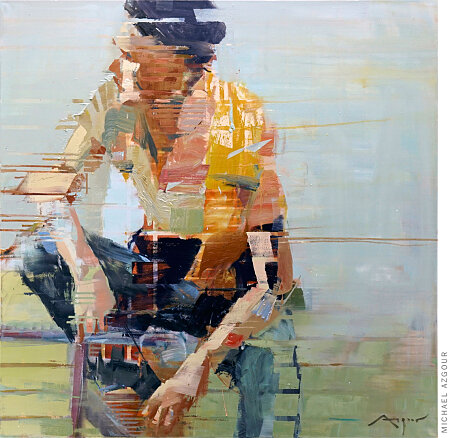
The Sense of the Past (A Lesson from the Master)
Working it through on my own, then, I concluded that perhaps my younger self wanted the insight I could give him about his future in the profession, or suspected that I had something complimentary to impart about the way our years in it have played out.
The book he held in my dream was On the Road. You’ve read it, perhaps? Oh, you’ve read of it—that’s a promising start down the road, anyway. Well, at eighteen I did read it, all the way through, in fact. Each day, I spent my lunch hour there behind the library, with a book, on a bench under the trees, eating my sandwich and reading.
Well, using only Henry James and my own musings to guide me, I concluded finally, despite my usual belief that the laws of nature are inviolate, that if I went back and lurked long enough in Bryant Park, I’d come upon that boy I once was, who was waiting for me to find him just as surely as Spencer Brydon’s spectral other had waited for Brydon. So, this past summer, I flew to New York and went to Bryant Park just as soon as I’d checked into my hotel. I got there at lunchtime and immediately began looking for a tall, thin eighteen-year-old with eyeglasses, who was sitting alone and reading a book. I didn’t expect there would be many, and, in fact, I realized immediately that there weren’t even many books to be seen, though there were countless “electronic devices.”
I didn’t find my younger self sitting there that day or the next. And yet, I came to feel more certain that I wasn’t on a fool’s quest, or a madman’s. You see, there was something in the atmosphere of the place itself that told me he, or shall I say “I,” would be there. The library itself, a lovely vestige of the time when books mattered; the trees, most of them old enough to have shaded me as I read there five and a half decades before; and the nearby buildings that were still there from my youth all told me that what I was looking for in the park now, so many years later, was there, too.
Late in the afternoon of the third day of my search, I sat, book in hand, peering about the park as clouds gathered, driven by a sudden breeze from the west, off the Hudson. A large scrap of newspaper blew against my leg and wrapped itself around it. I picked it up and saw that it was from the front page of the New York Herald Tribune, which hasn’t existed since the 1960s. The paper had the date of the very month and day on which I was now sitting in the park, but the year was 1964. Under the masthead was a brief weather report—drizzle and mist were predicted for the evening. I was certain now that the evening ahead for me, whether it was in 1964 or this year, would bring me to the meeting I’d felt so compelled to seek.
After leaving for a hurried supper and a glass of wine or two, I was back in the park. As predicted, a mist had rolled in, and it was drizzling, making the evening an unseasonably chilly one. The few who were in the park passed through quickly. The lamplight itself drifted into the damp haze. I saw no one sitting. Though the auto traffic outside was no less heavy than usual for a summer evening in the city, it seemed less noisy, as if the park were somehow drawing apart from the blaring present.
As I say, I saw no one sitting, and yet I knew I soon would. After patrolling the park for about half an hour, I stopped at the spot where I recalled sitting most often in that summer of 1964. I was on the north side, and the Bryant Park Hotel, a lovely 1920s structure of black stone, stood across from me, looking just as it had back in ’64. As a boy, I’d loved glancing up at it from whatever book I was enjoying as the minutes passed too quickly, hurrying me back to my tedious job and my tedious co-workers. I stood there now and stared at it affectionately. I felt closer now than ever to my younger self.
I looked about, saw no one, and decided to walk on, sensing that it wouldn’t be long now. I’d only walked for a moment before I felt a cold breeze at my neck. I turned and saw, seated in a spot that I had just stood beside as I looked at the hotel, the figure of a young man wearing a rain jacket with the hood up, his head bent over a book, its pages barely visible in the clouded lamplight. He’d appeared out of the mist itself, it seemed.
I walked back toward him. Despite the sound of my steps approaching in the quiet park, he continued to stare down at the book he held. Even as I stopped in front of him, he didn’t look up. His khaki chinos, white socks, and scuffed Weejun loafers were part of my standard outfit in the summer of 1964.
“Hello,” I finally said, hardly able to speak, my throat tight, my heart going as rapidly as any author would claim it was, and my arms and legs weak and tingling. “What are you reading?”
Still without looking up, he said, “Turn of the Screw,” his tone one of faint irritation, as if he didn’t care to have his reading interrupted.
